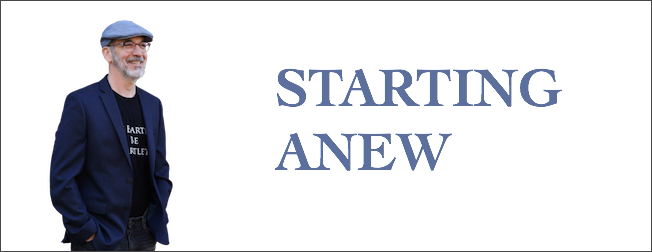
Being laid off in your 50s is odd, and can be disorienting if for no other reason than you lose the rails upon which your daily routine runs. Locomotives make progress on tracks; not so much on sand. I’ve now been unemployed for five months with no full-time gig on the horizon. Pro-Publica recently reported on the phenomenon of 50+ aged workers being laid off, noting
our analysis found that between the time older workers enter the study and when they leave paid employment, 56 percent are laid off at least once or leave jobs under such financially damaging circumstances that it’s likely they were pushed out rather than choosing to go voluntarily.
(Emphasis mine.)When I first became jobless, people tried to encourage me by saying things like, “You’re smart; you won’t have a problem finding work.” And, “Any company would be lucky to have you.”
Only one in 10 of these workers ever again earns as much as they did before their employment setbacks, our analysis showed. Even years afterward, the household incomes of over half of those who experience such work disruptions remain substantially below those of workers who don’t.
I also believe the latter to be true, as well as the first part of the first sentiment. “You won’t have a problem finding work,” unfortunately, hasn’t proven accurate. Like thousands of other de-employed middle-aged workers I have applied to scores of jobs, most of which pay far less than what I was previously making.
What’s hilarious in an ironic way are the many rejection emails that say, “Don’t be discouraged; keep applying.”
How about, “Hire me and I won’t be discouraged.”
I even had one company after twice not offering an interview, email and ask me to evaluate their hiring process. “Not good,” “tone deaf,” and “one-star” come to mind.
Rather than crawl into a hole, though, I decided to do something a growing number of 50s-aged Americans are doing—become an entrepreneur. (As did my wife, but that’s another story.) After one effort moved too slowly, I pivoted to something I know how to do—podcasting—intending to turn it into a source of income. Hence, Uncommontary.
Houston, we have a problem.
It’s no secret that American society is drowning in an ocean of anger, finger-pointing, and tribalism. Writing in Politico, Michael Grunwald asserts:
At a time when Blue and Red America have split into two warring tribes inhabiting two separate realities, and “debate” has been redefined to evoke split-screen cable-news screamfests, this ferocious politicization of everything might seem obvious and unavoidable. But it’s also dangerous. It’s as if the rowdy cultural slap-fight the kids were having in the back seat has moved into the front, threatening to swerve the national car off the road. Transforming difficult analytical questions into knee-jerk emotional battlegrounds will dramatically increase the danger that thoughtless short-term choices will throw off our long-term national trajectory. And even beyond the impact on the quality of our public policy decisions, the ferocious politicization of everything is not healthy for the American body politic, which is why a Russian troll farm used fake social media accounts to gin up protests and counterprotests about hot-button issues like police shootings and Trump’s border wall. Our foreign adversaries like it when we yell at one another.
Dan Darling connects our flame-throwing to a need to rediscover human dignity:
Imagine, for a moment, if God’s people began to lead a new, quiet revolution whose foundation was a simple premise: every human being—no matter who they are, no matter where they are, no matter what they have done or have had done to them—possesses dignity, because every human is made in the image of God. By God’s grace, our churches would change, and our communities would change.
Uncommontary is a step in that direction.
Conversations. Clarity.
Imagine conversations that are not filled by yelling and screaming, or bookended by finger-wagging and chair-throwing. Conversations where the guest actually has a chance to speak her or his piece without a barrage of interruptions from the “host.” Imagine getting enough clarity to know why you agree or disagree.
Imagine guests who can articulate a position.
As a follower of Jesus I’m weary of click-bait headlines, gotcha-interviews, outright falsehoods. Maybe Darling’s proposed revolution should indeed be “quiet.”
The Season 1 lineup of Uncommontary includes Twitter’s Historian in Residence (race and southern politics); a Muslim attorney and teacher (Sharia law and extremism); an English professor (reading well); a senior writer for the flagship U.S. conservative magazine (the state of conservatism and online threats); a Native American poet/author (missions vs colonialism); a pastor/theologian (justice); a Brooklyn public defender (bail, the poor in the legal system); a public theologian (evangelical voters); a journalist (sexual abuse in churches); and a leadership guru (organizational leadership).
It’s a stellar lineup. Scheduled launch date is January 15, 2019. Uncommontary will be available in all major podcatchers including iTunes, Overcast, Stitcher, Podbean, and Google.
Not just a job, an adventure.
Uncommontary is an entrepreneurial business venture funded by advertising and individuals who believe content (and content creators) are worth supporting. I’m using Patreon for the monthly support, which starts at $2/mo for the lowest tier. Yes, you read that right: a mere $2 a month gets you on board. I’m using PayPal for single or periodic gifts.
Please don’t think your support is too small to make a difference. Every dollar helps, literally.
Thank you in advance for your help. If this is to be my means of income for now—or at least part of it—I’ll give it my best shot. With your help, I will succeed.